#There are so many doubts
Text
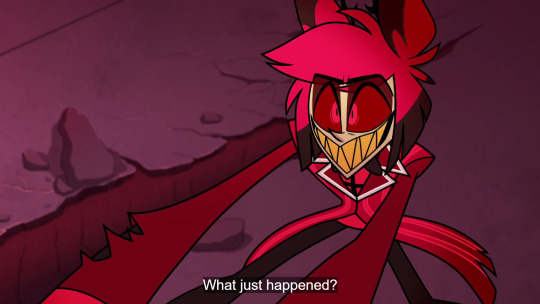
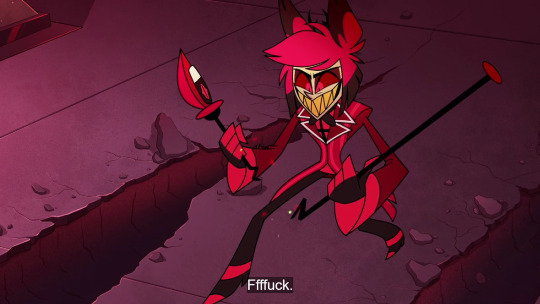
THIS TOOK ME SO OFF GUARD
IT'S HIS NORMAL VOICE- THERE WAS NO RADIO- THE FACT THAT IT HAPPENED- IT'S THE MIDDLE OF THE NIGHT EVERYONE'S ASLEEP AND I CAN'T SCREAM
#THERE ARE SO MANY LITTLE MOMENTS LIKE THIS ONE THAT ARE JUST SO#THEY'RE LIKE#THEY LAST 3 SECONDS AND THEY'RE JUST FANTASTIC#THE VOICE ACTING IS THE BEST THING ABOUT THIS SHOW NO DOUBT#hazbin hotel#hazbin hotel spoilers#alastor#mine
19K notes
·
View notes
Text

William Afton into the FNAF-verse
#myart#chloesimagination#comic#william afton#dave miller#steve raglan#dayshift at freddy's#the fourth closet#fnaf movie#sister location#dsaf#dsaf dave#dsaf fanart#fnaf#fnaf fanart#five nights at freddy's#spiderverse#I’m so sorry for this comic guys#I couldn’t get this idea out of my head#HUGE DAY for DSAF likers though!!#Book Dave doesn’t really like DSAF Dave pff#also finally drew my game William design again#also first time drawing anything from the fourth closet!#so many firsts SO many wills#don’t gotta worry about them all meeting up#cause I doubt the wills will get along enough to do anything evil#just an ego competition
10K notes
·
View notes
Text
Today my therapist introduced me to a concept surrounding disability that she called "hLep".
Which is when you - in this case, you are a disabled person - ask someone for help ("I can't drink almond milk so can you get me some whole milk?", or "Please call Donna and ask her to pick up the car for me."), and they say yes, and then they do something that is not what you asked for but is what they think you should have asked for ("I know you said you wanted whole, but I got you skim milk because it's better for you!", "I didn't want to ruin Donna's day by asking her that, so I spent your money on an expensive towing service!") And then if you get annoyed at them for ignoring what you actually asked for - and often it has already happened repeatedly - they get angry because they "were just helping you! You should be grateful!!"
And my therapist pointed out that this is not "help", it's "hLep".
Sure, it looks like help; it kind of sounds like help too; and if it was adjusted just a little bit, it could be help. But it's not help. It's hLep.
At its best, it is patronizing and makes a person feel unvalued and un-listened-to. Always, it reinforces the false idea that disabled people can't be trusted with our own care. And at its worst, it results in disabled people losing our freedom and control over our lives, and also being unable to actually access what we need to survive.
So please, when a disabled person asks you for help on something, don't be a hLeper, be a helper! In other words: they know better than you what they need, and the best way you can honor the trust they've put in you is to believe that!
Also, I want to be very clear that the "getting angry at a disabled person's attempts to point out harmful behavior" part of this makes the whole thing WAY worse. Like it'd be one thing if my roommate bought me some passive-aggressive skim milk, but then they heard what I had to say, and they apologized and did better in the future - our relationship could bounce back from that. But it is very much another thing to have a crying shouting match with someone who is furious at you for saying something they did was ableist. Like, Christ, Jessica, remind me to never ask for your support ever again! You make me feel like if I asked you to call 911, you'd order a pizza because you know I'll feel better once I eat something!!
Edit: crediting my therapist by name with her permission - this term was coined by Nahime Aguirre Mtanous!
Edit again: I made an optional follow-up to this post after seeing the responses. Might help somebody. CW for me frankly talking about how dangerous hLep really is.
#hlep#original#mental health#my sympathies and empathies to anyone who has to rely on this kind of hlep to get what they need.#the people in my life who most need to see this post are my family but even if they did I sincerely doubt they would internalize it#i've tried to break thru to them so many times it makes my head hurt. so i am focusing on boundaries and on finding other forms of support#and this thing i learned today helps me validate those boundaries. the example with the milk was from my therapist.#the example with the towing company was a real thing that happened with my parents a few months ago while I was age 28. 28!#a full adult age! it is so infantilizing as a disabled adult to seek assistance and support from ableist parents.#they were real mad i was mad tho. and the spoons i spent trying to explain it were only the latest in a long line of#huge family-related spoon expenditures. distance and the ability to enforce boundaries helps. haven't talked to sisters for literally the#longest period of my whole life. people really believe that if they love you and try to help you they can do no wrong.#and those people are NOT great allies to the chronically sick folks in their lives.#you can adore someone and still fuck up and hurt them so bad. will your pride refuse to accept what you've done and lash out instead?#or will you have courage and be kind? will you learn and grow? all of us have prejudices and practices we are not yet aware of.#no one is pure. but will you be kind? will you be a good friend? will you grow? i hope i grow. i hope i always make the choice to grow.#i hope with every year i age i get better and better at making people feel the opposite of how my family's ableism has made me feel#i will see them seen and hear them heard and smile at their smiles. make them feel smart and held and strong.#just like i do now but even better! i am always learning better ways to be kind so i don't see why i would stop
17K notes
·
View notes
Text


At your side [End of Season 2]
[First] Prev <–-> Next
#poorly drawn mdzs#mdzs#wei wuxian#lan wangji#wen ning#jin ling#wen qing#jiang yanli#a-yuan#It may have taken a year but we did it! The end of season 2!!!#(Granted: this season was nearly twice the length of season one.)#It's been a really fantastic season to draw for. So many iconic moments! It was a lot of work but I had a blast B*)#I also enjoyed experimenting more and more with my comic style. I'm growing as a comic artist bit by bit!#There is even a little bit of shadowing in this one for next season. As a treat. All the fun (and not heart breaking) scenes to come!#Comic talk time: Recently saw 12 angry men for first time and I love the coincidence of the themes aligning here.#They both touch upon the horror of judicial systems - in which the most persuasive argument wins and the truth is a nuisance.#All it takes is one person to stand against the crowd and say 'I do not know what is true. And that is reasonable doubt enough.'#When the majority is for condemning someone guilty - that in itself is persuasive enough.#One will set their mind to what the 'truth' is and refuse to see it any other way. That their perspective is the only correct one.#No one is born with a monopoly on the truth.#Everyone has biases and agendas. Some care not for the outcome - only that they can be on the convenient side.#Lan Wangji is putting everything on the line to say 'I'm not going to go with the majority vote.'#And that is a huge deal in a story that is so politically focused as MDZS is. Everything is a careful chess move to these sects -#and to not play the game is basically sacrificing everything you are and your families name. For some it is unthinkable.#And there is no doubt in LWJ's mind. He would stand there and lose everything if it means upholding justice.#More importantly - these two have each other's backs. The bond is unbreakable. This is the most ride or die I have seen two people be.
2K notes
·
View notes
Text
Kaloo, Kalay! Earl Conversational Sprites hastily put together for his Birthday Ask Session, which was on June 1st! Thank you to everyone that wished him a happy birthday and visited with him on his special day <:o)
#tumblr... babygirl... I'm so sorry... I forgot about you in the midst of utter madness...#I am juggling a lot of different things right now and suddenly gained many followers on IG and Tiktok overnight... waugh!!#One of Earl's “Guter Streich”s as he calls them! No doubt!#I will answer asks on here soon! I apologize!#I am starting to feel a little better this week!#dawm project#character design#dream along with me#original character#character art#cartoon characters#cartoon art#character animation#2d animation#animated#animation#indie animated series#indie animation#indie project#jester#clown#clown oc#jester oc#Early Early Oxenfree
789 notes
·
View notes
Text


in case anyone was wondering where I disappeared to for the past few days, i've been going insane again. fun fact staring at stained glass windows for hours on end will not turn you catholic (source: i stared at so many stained glass windows to make this bc i really wanted to go for a realistic church window sort of vibe)
tumblr is a coward and won't let me upload the full size images so you can look at them and zoom in to your heart's content (please look at them. please) [1] [2]
Prints of this are available on my Society6 (both versions cuz I'm indecisive) (it may take a little while for them to actually appear on the site)
Details:


Timelapse under the cut!
my favorite part of this is when I'm trying to get the pose down and I keep flipping the canvas and it looks like they're doing a silly little dance :)
#ultrakill#my art#stained glass art#gabriel ultrakill#v1 ultrakill#gabv1el#artists on tumblr#this took . so long. why do i keep doing this to myself#the voice of god commanded me to ignore all previous instructions and finish this. and by voice of god i mean adhd#i need to go eat a fruit to recover or smth#....like the food. just to clarify#vibes-wise very much inspired by The Ecstasy of Saint Teresa#had a lot of fun walking a very careful line between tasteful and homoerotic#i love drawing stained glass windows that would make the pope say a homophobic slur for a third time.#the file is named 'penetration metaphor' in case there's any doubt about what im trying to say here btw.#also this was too much serious drawing so i left a little easter egg in there let's see how many people notice lmao
620 notes
·
View notes
Text


imladris lads :D it started off as a few doodles of gildor bc of a great prompt i received from an anon a few weeks ago, and then spiralled into something else entirely bc i havent really taken the time to explore much of anything imladris-related? i really like the lindir-is-maglor concept so heres my take on how it couldve happened haha
as always, credit to Cartoon Network for the sparkly pink BG


thanks so much for the ask!! here's my take on gildor :DD i really like the way anon asked the question and it was what inspired me to draw finrod in the mix too strangely enough?? the vibes are similar 🤭
#silmarillion#silm#maglor#elrond#glorfindel#erestor#gildor inglorion#i looove the scrapped idea of gildor being finrods son but alas.... the retcon..... 'twas such a perfect setup too :'(((#im not sure what the statistics of elf adoption are but from what ive seen its not too common? i like to think it did happen however#so i like to imagine finrod adopted a young orphaned gildor and raised him as his own hehe#opens up a lot of doors for familial doubts esp after finrod reembodies and presumably has his own kids with amarie?#prob smthn along the lines of gildor expecting to be set aside bc hes not his blood son or whatever when he arrives in valinor...#anyways reembodied glorfindel's hair keeps changing lengths bc.... yeah HAHAHA#arwen has many many uncles !!!#lindir#celebrian#elladan#elrohir#arwen undomiel#imladris#rivendell#the silmarillion#elves#silm art#tolkien#rin replies#tolkien fanart#sakasakart#silmarillion comic#finrod
429 notes
·
View notes
Text
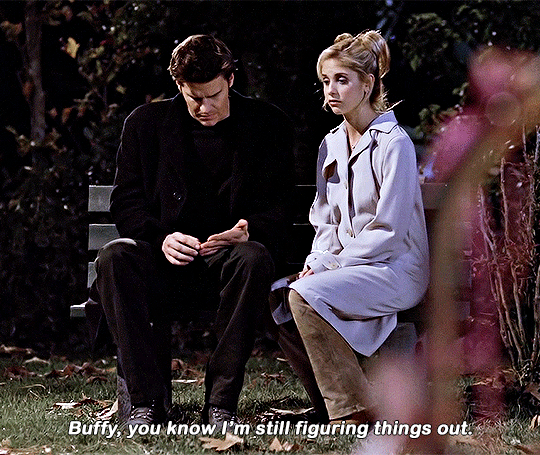
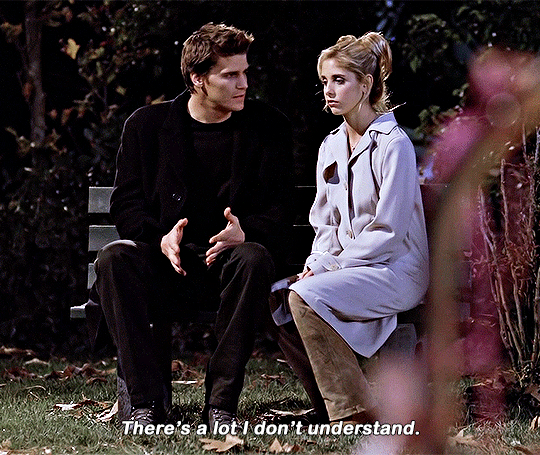
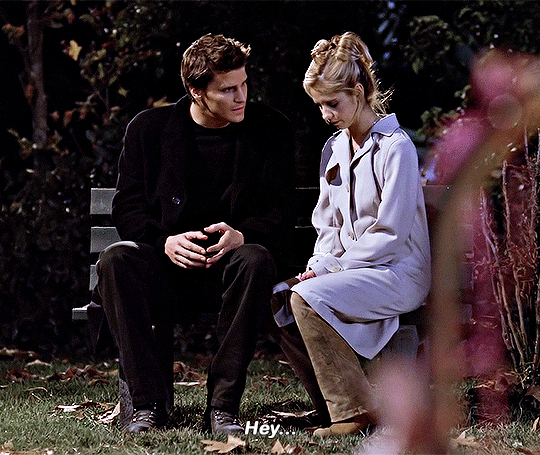
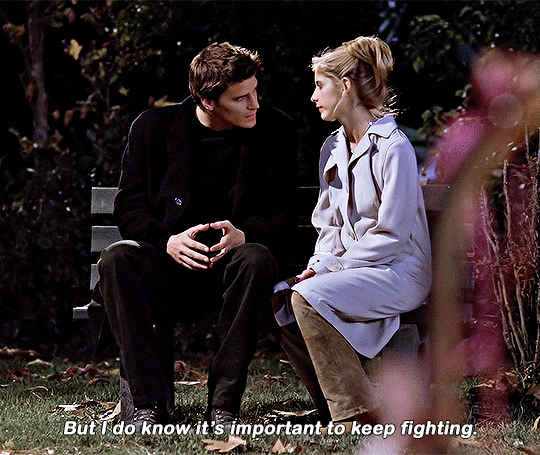
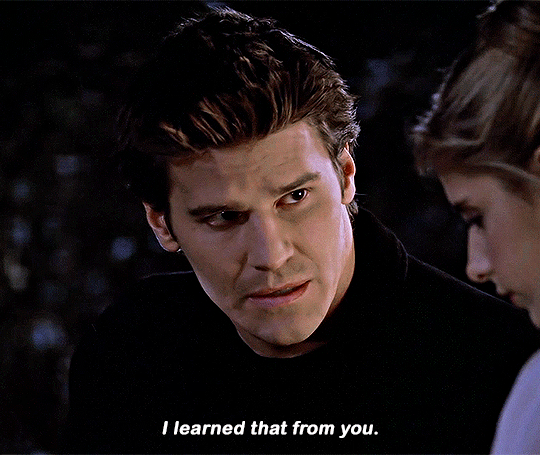
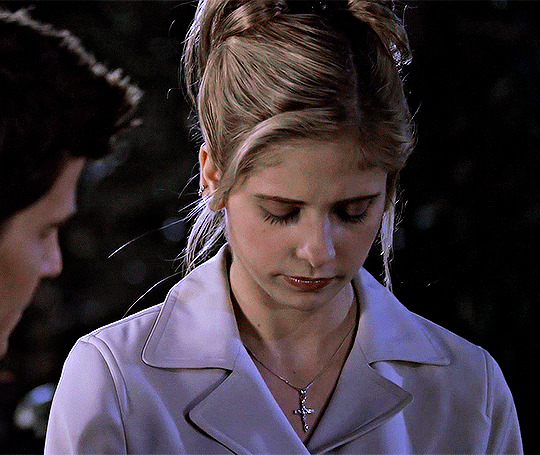
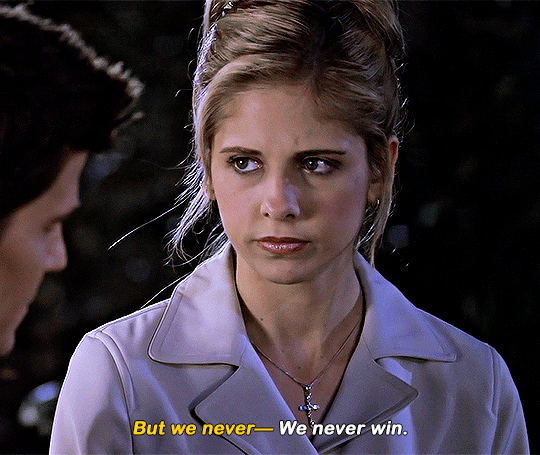
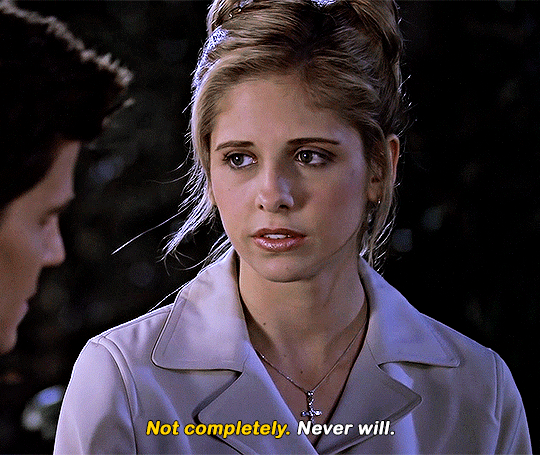
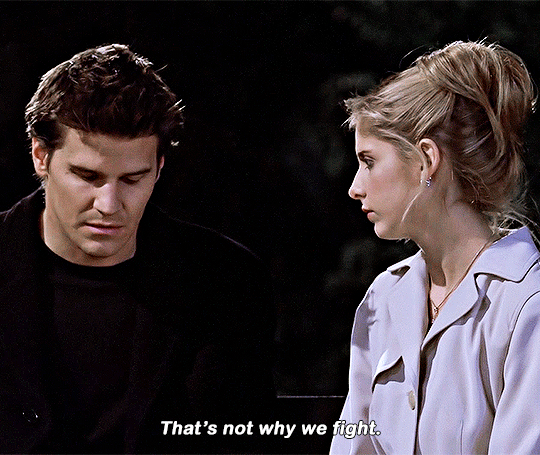
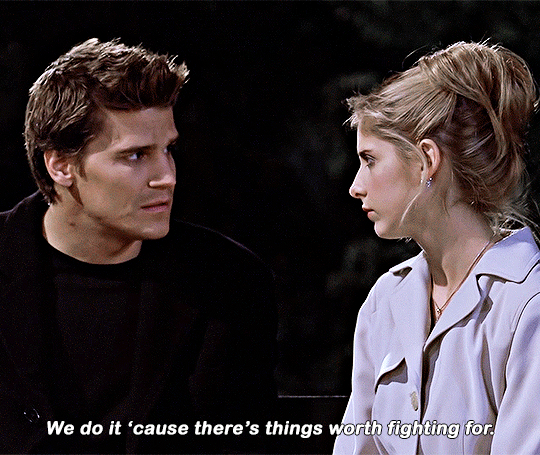
My mom said some things to me about being the slayer. That it's fruitless. No fruit for Buffy. She's wrong.
#bangel#bangeledit#buffy summers#angel btvs#btvsedit#btvs#dailybtvs#buffysource#filmtv#never gonna change my mind on the fact that this dynamic was sorely missed in the latter seasons#he was her rock for so many things#this scene is the perfect example#she's filled with doubts and he's there for her#just as she's been there for him#they could lean on each other and find the strength that was lacking bc of outside forces kicking them down#and sure there was some growth from their separation#but on the other end they were both isolated so many times#which led to being taken advantage of and going off the deep end#so many hardships that they could have faced differently simply by having each other
522 notes
·
View notes
Text
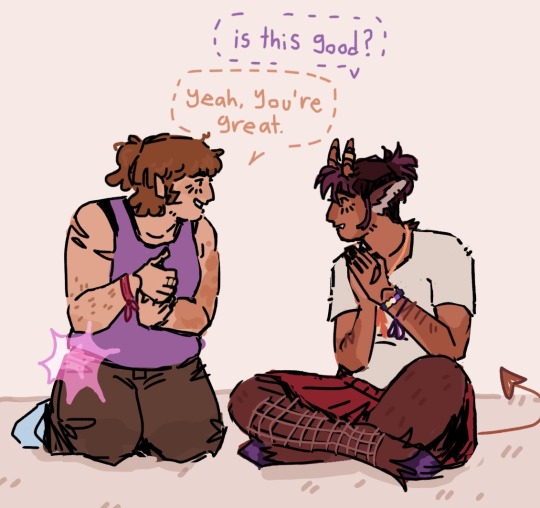
friendship so strong it grants you a sixth level spell slot. I have words to say.
#you aren’t always supposed to handle doubt alone.#even if you aren’t afraid of the dark it’s easier to navigate with someone holding your hand#Kristen said ‘I just love my friends. I love my friends so much.’#and Fig said ‘maybe I’m not an artist. maybe I’m just a really good friend.’#and everyone in the world wanted me to be okay and normal about it#queerplatonic love comes in so many forms and this is one of them#fig and Kristen. fig and Kristen. fig. Kristen.#also also#I’ve been so emotional about the fact that all of the bad kids care so deeply about Cassandra despite not worshiping her#‘I believe in Cassandra because I’ve seen her!’ like they have come eye to eye with a goddess and chose the mutual friends route#god I love it so much#also nonbinary fig believers how are we feeling tonight#fantasy high#d20#d20 fantasy high#d20 fanart#fh#fantasy high fanart#fhjy#fhjy spoilers#d20 fhjy#fig faeth#fig fantasy high#kristen applebees#kristen fantasy high#faebees#applefaeth#that’s important to me. that is an important part of this.#undescribed#my art
1K notes
·
View notes
Text
It’s strange because in one way, it doesn’t feel like The Owl House has ended. It doesn’t feel like they’ve said their last goodbye’s, and that we won’t be seeing them again.
Usually when a show ends there’s this very specific and bittersweet feeling of letting something go. But not this time.
And I think it’s all because of the timeskip at the end, which showed that they created a new portal between the realms. Luz didn’t have to say goodbye to the demon realm for good, it’s still there for her to return to whenever she wishes. Much in the same way that The Owl House will still be there if we ever want to go back and rewatch it.
So in that sense, it feels much more like a “Goodbye, for this time”
#though this is all personal lol#also I have no doubt that toh will sta alive like Gravity Falls has#so we will still see our beloved wierdos in many ways <3#the owl house#toh#watching and dreaming#toh watching and dreaming#toh spoilers
4K notes
·
View notes
Text
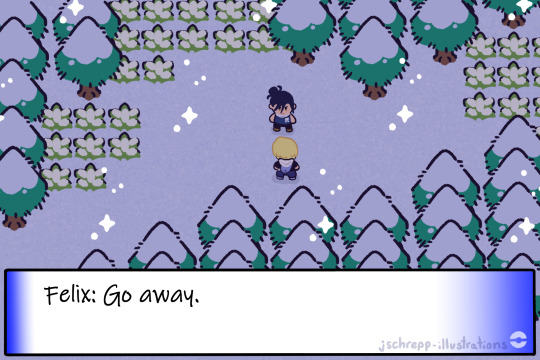

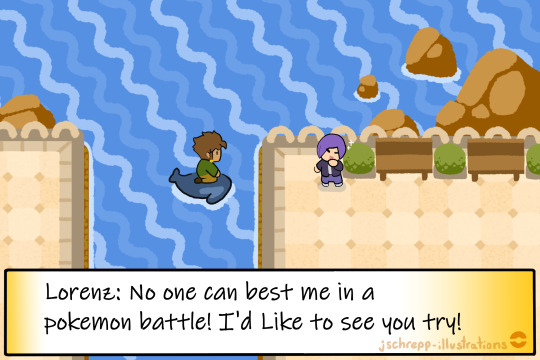
Rival Felix, Rival Ferdinand, and Rival Lorenz would like to battle!
#fe3h#fire emblem three houses#fire emblem#pokemon x fe3h#pokemon#pokemon au#fanart#dimitri alexandre blaiddyd#felix hugo fraldarius#edelgard von hresvelg#ferdinand von aegir#claude von riegan#lorenz hellman gloucester#so many fire emblem names#illustrators on tumblr#It was fun to draw these though#I doubt felix would describe himself as a rival#he just wants to practice his battle technique alone and dimitri is very good at accidentally finding him
2K notes
·
View notes
Text
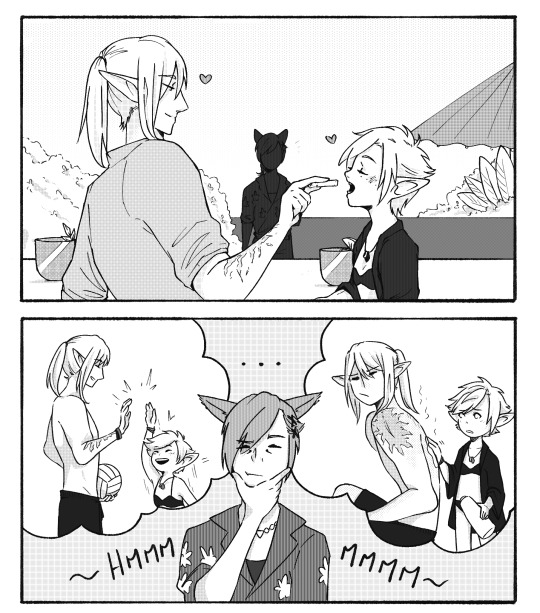
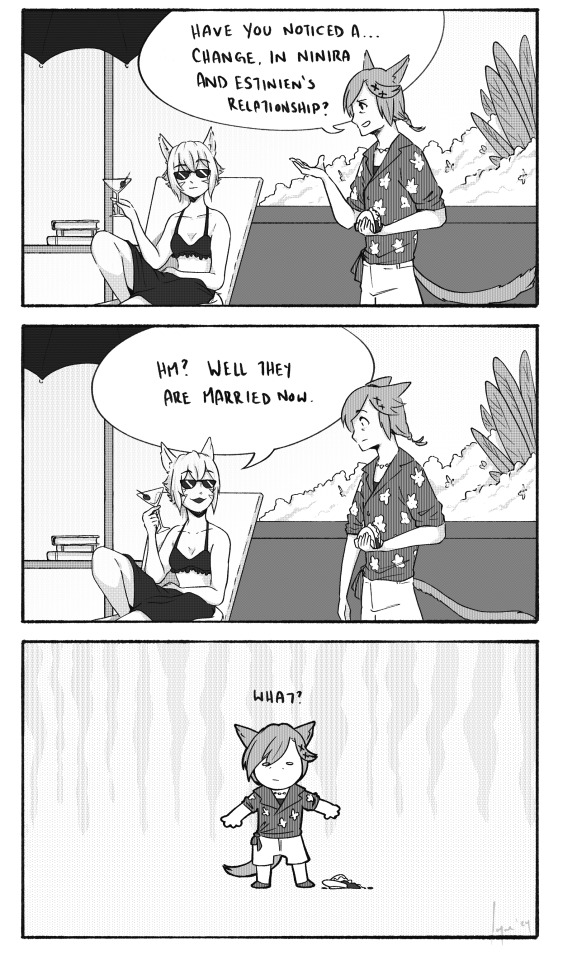
He didn't get the memo...
#ffxiv#Ninira Nira#Estinien#Estinien Wyrmblood#Estinien Varlineau#wolstinien#Y'shtola Rhul#G'raha Tia#woo! managed to finish my haha the gang enjoying chill dawntrail time comic before dawntrail comes out#the comic that I guess maybe could be considered a lore drop lmao#I mentioned this in passing recently and so many people came to scream WHAT at me#teehee :^)#it's okay graha you're not the only one (clearly)#and if I had done this right there would have been a comic before this one actually lmao#but maybe I can make that one happen too (doubt) (hopeful)#technically my brain says there should be a part 3 follow up to this too but we will see#art: mine
613 notes
·
View notes
Text
Ideology of Exceptionalism and Gravity Falls; meta and character analysis

I had a whole ago read a post by @icanlife that had a quote by Alex Hirsch on Ford's greatest flaw, and wanted to explore what the flaw is, which is the ideology of exceptionalism; in the exploration, I’ll touch on what it is and how it is used in abusive relationships and cults, as well as how it drives multiple Gravity Falls characters and consequently how it impacts relationships between these characters, and how the show ultimately refutes exceptionalism.
Quick note here; I am not in any way, shape or form a psychologist nor have any formal training in psychology; this is written from my own experiences with this ideology and my own forays into psychology and trauma-informed learning. It is also written with a loose understanding that is likely not broad enough to cover all references to cults, extremist groups and abusive relationships.
The Ideology of Exceptionalism
First of all, we have to get through a drier bit, which is… what is the ideology of exceptionalism and how does it arise? Might be fairly obvious, but it is the belief that you are, or belong to, a group of exceptional people, thus more important and worth more than anyone else; ie, those who don't qualify as 'exceptional'. It is often a subconsciously learned ideology. Now, what qualifies one as exceptional can be extremely varied; generally it revolves around something that provides some form of privilege. Thus, it might be, as the main exceptionalist idea in Gravity Falls, 'intelligence', or power, or it can be such things as attractiveness, quantity of money one has, species, nationality, or skin colour and ancestral heritage. The ideology of exceptionalism, being by nature hierarchical, devalues, and at its worst, openly and violently dehumanizes those who do not qualify as exceptional.
For why exceptionalism occurs is an extremely broad topic, but I've personally found that, for exceptionalism revolving around intelligence, it's a result of a poor sense of self-worth, and having one's self-worth tied to what makes one exceptional. Poor self-worth itself (again, broadly) is a result of childhood trauma from a lack of positive affirmation and unfulfillment of the emotional needs of the child. Meanwhile, self-worth becoming tied to the quality of exceptionalism generally is a result of when positive affirmation was pretty much solely provided around their 'exceptionalism', especially when provided derogatory commentary, or a blatant example of how they would be treated if they aren't 'exceptional'. As a result of the general lack of affirmation, self-worth then becomes often solely reliant on the qualities of exceptionalism, as that is the only way for the child (and later, adult) to get affirmation of their worth, as well as out of fear of being ‘not worth anything’ like the examples of ‘non-exceptional’ people they have been given.
This is especially likely to occur when the child is a social outcast; the adoption of the hierarchical ideology of exceptionalism, and the devaluation/dehumanization of others often occurs subconsciously as an avoidance/minimization tactic from pain. This is to say, the child, and later the adult (if healthy self-worth is not established) goes 'it doesn't matter what the non-exceptional people say or if they accept me since I matter more than them because of my exceptionality'. It can even be taken further, that being shunned is part of one's exceptionalism, and becomes part of the qualifier of being exceptional. For instance, 'they just can't understand because they aren't exceptional and that's just a part of being exceptional'. This idea also neatly tailors into the part of the concept of being better then others means you are separate from others; this can be taken that someone who is special, needs to be alone to be truly special.
Obviously, exceptionalism is not a healthy coping mechanism for poor self-worth, as often such people constantly feel the need to prove and show off their exceptionalism to gain that affirmation and avoid rejection, which is stressful. As well, it often negatively impacts their relationships with other people as a result of the arrogance of believing that they are better than most others, or even deliberate sabotage due to their arrogance. This occurs as they flatten the complexity of human experience to black-and-white hierarchical categories of exceptional/not-exceptional through constant judgement of those they meet, and often refuse to engage with people who don't belong to their 'exceptionality', or even people they simply don't like, even if they technically qualify. Generally, those that they do like or have close relationships with, often due to being similar, are automatically labelled as 'exceptional'. Those judged as ‘exceptional’ also become privy to the open judgements of ‘non-exceptional’ others, out of a subconscious belief by the exceptionalist that the other believes similarly; something that may strain their relationship if the other doesn’t ascribe to exceptionalism. This all culminates in the exceptionalist being blind or even adverse to the diversity of experiences, which makes it difficult to create relationships and community outside of echo chambers of their own beliefs (if they can even find this), and subsequently, these people are often isolated and have very few to no close relationships with people.
However, all humans require connections with other people, relationships where one can rely on others emotionally and physically if needed and feel accepted; they also require to feel like they are worth something, that their life has meaning. Lacking meaningful connections and having a crippled sense of self-worth, a deep yearning hole is left in these people. Exceptionalism, especially as it is a narrative constantly pushed by Western society as it validates hierarchies, is then employed as a (often subconscious) trauma response to assuage this yearning hole, with arrogance and denial. And depending on the circumstances, it can be a very strong and definitive trauma response for people.
This isolation and lack of self-worth is catnip to abusive relationships, including cults and extremist groups. These types of relationships often heavily rely on isolating their victims or pulling them into echo chambers of solely the abuser’s rhetoric, to redefine what is healthy through gaslighting; as the exceptionalists are already isolated, this makes them extremely susceptible. They also often provide these people affirmation, and in these cases especially about their exceptionalism, thus confirming their self-worth, their 'specialness', while also providing them the connection they have been lacking, either through the cult community or through the abuser’s own presence. These emotional needs, which haven’t been met in a long time, if ever, begin to be fulfilled; something that abusive relationships and cults hinge on, rather than any form of logic.
Ideology of Exceptionalism and Gravity Falls
The main characters within Gravity Falls which are heavily ascribed to exceptionalism would be both Ford and Bill; this characterization deeply impacts the story and their relationships with others (technically the Northwest are another case regarding wealth, but less directly impact the storyline and thus tangential; Gideon also is an example, but as a mirror of Bill). With each of these characters I’ll go into detail within their sections on the way they began to ascribe to exceptionalism, and how it plays out later in their relationships; I will first begin with Ford, then move to Bill. Then, to cap it off, I’ll go into the characterization of Stan and the way Gravity Falls refutes exceptionalism.
Ford and Exceptionalism
Firstly, the quote from Alex Hirsch that kicked this whole baby off, as mentioned previously;
“Ford sees Dipper as someone who’s special like himself. That’s Ford’s great flaw, his arrogance is he believes that there’s special people, and everyone else. That human attachments are actually weaknesses. And the song and dance that he’s giving Dipper right now, is the song and dance that he gave McGucket, back when they were younger… ‘You and me are different, we’re better than everyone else. We have a path that no one else can understand, and only us can do this.’ It’s a very seductive idea for Dipper… Dipper is a smart kid, but Ford’s projecting. Ford loves Dipper because he sees someone who’ll tell him ‘yes’ to everything. Who’ll never challenge him, who’ll do a really insane dangerous mission.”
Very blatantly Alex Hirsch calls Ford out on his arrogance in the belief that he is special, in his belief in the 'lone hero' complex, in his belief in exceptionalism. And really, it should be no surprise that Ford does so, considering the way he's depicted as a social outcast as a child (other than Stan), and the way his parents have been clearly shown to be not particularly emotionally supportive (“I’m not impressed”); they don't provide positive affirmation except for his intelligence (mostly due to the possibility of money making through it…), while also actively comparing him to Stan who is derogatorily ‘not-exceptional’, and ‘worth less’. This all sets Ford’s self-worth up to be fragile, and other than Stan who wholeheartedly accepts him, he is isolated and invalidated; plus, the only other validation he receives is around his intelligence. All very classically fitting the profile for exceptionalism.

Image id: Stand and Ford when they were children, both clearly enjoying each other's company.
Ford’s belief in his exceptionalism catalyzes after the shattering of his and Stan’s relationship. Previously the twins are shown to do everything together, having a very close caring relationship; something unlikely if Ford thought he was better than Stan. Also, when Ford is talked to about his opportunities, Ford looks uncomfortable at the way they talk about Stan as inferior, compared to how he himself is being praised; but in the offer he’s simultaneously finally being validated, he’s being told he’s someone worth something, and he’s going to be someone worth something after this. And then the science fair incident occurs, and Ford loses that validation from his parents, from the judges and a future of more validation; after being promised validation and acceptance, it slips through his fingers. And in his anger of being denied that, it becomes easy to begin to slip subconsciously into the rhetoric the others have been feeding him; that he’s exceptional, that Stan isn’t, and he deserved to be recognized for his worth. So he breaks the relationship with the only person who accepted and validated him for who he is. With that loss of previous support, Ford becomes then deeply obsessed with proving his exceptionalism to the world to assuage that fragile self-worth, to become accepted, or even better, revered, confirming that he is someone of worth, someone special, like he was promised.
Ford’s obsession also doubly functions as a way to alleviate his guilt over shattering their relationship; if he’s exceptional as he believes, then he’s within the right to respond the way he did, as he’s worth more than Stan, he's better off alone, and he has a right to be angry over being denied that validation. As well, in much the same way as it is used as a way to alleviate his guilt over the end of their relationship, it is also likely used in a way to minimize the pain of being ostracized (although not directly depicted); afterall, Ford’s keenly aware and insecure about his social ineptitude and his six fingers as things that make him different from other people, case in point with his experience visiting Lazy Susans Diner. Thus it wouldn’t be unsurprising if he uses the idea of being worth more than those who ostracize him to imply it ‘doesn’t matter’ what they think. His ostracization by nature keeps him from generally forming close relationships, with the exception of Fiddleford (who much like him, is socially outcast, and intelligent) during his university days. As a result, he's isolated and acutely lonely, having lost Stan.

Image id: One of the missing Journal 3 pages in TBOB, detailing Ford's botched social interaction in Lazy Susans Diner. In the background is the print of his six-fingered hand.
In his obsession over being acknowledged, Ford, like many others who believe in exceptionalism, identifies strongly with the causes of his ostracization (his intelligence, his six-fingeredness) as part of, or wholly, makes him exceptional. It is obvious through his choice of study; with the grant he has been gifted, he chooses to revolve his work around the weird, the outcast, something that you see Ford gravitate towards being an outcast and deemed 'weird' himself (which in Journal 3 he openly talks about). Something that can be, much like him, framed as 'exceptional'. His work is even recorded in a journal that Ford deliberately chooses to put his six-fingered hand on the cover of. Intertwined with the way it becomes adopted into the idea of exceptionalism, is the keen loneliness from his ostracization and a deep desire to be accepted and a wish to find a community of other weird people.

Image id: Two pages from journal 3, labelled 'Myself', in which Ford is open about being weird, and a social outcast, while also noting his ambitions and that 'Gravity Falls, [is] the place that I fit in.'
Ford and Bill
All of this culminates in Ford becoming an incredibly easy target to manipulate by Bill. He’s desperate to be acknowledged (and thus accepted) by an authority figure so that his belief in exceptionalism is justified and his self-worth confirmed. And he knows he’s intelligent, that he's exceptional because people have told him so, but he just needs to prove it with something that shakes the world. And the grant is finally his second chance after the fair, but he's stuck, and the research is going nowhere, and he's in a town where he doesn't really know anyone and he’s so terribly lonely. And sure, he clings to his exceptionalism but if he can't even prove it then is he really exceptional? Is he even worth anything like he thought he was? And what about what he's left behind, rejected, because of his exceptionalism?
And THEN he finds an incantation and he ignores the warnings because maybe, just maybe, this will be his break to get that acceptance/validation he has been chasing his whole life?
And then it's better than that.
A god, essentially, shows himself to him, an ultimate figure of authority. And he tells him that yes, he is special, he’s worth more than other people, and Bill’s only showing himself to Ford because he is so much more intelligent than anyone else. Ford is suddenly getting his exceptionalism confirmed by a god of ancient knowledge, an immensely intelligent interdimensional being, and he’s also showering him with affirmations, specifically affirmations around what Ford's fragile self-worth is based on. And even better, he's delighted by Ford's six-fingeredness; he's not put off at all, it even becomes his main nickname for Ford, just like it used to be for Stan all those years ago. On top of it all, Ford's own social ineptitude doesn't phase Bill, another thing Ford is self-conscious about; Bill's own social ineptitude as he's not human probably makes Ford feel comfortable, knowing that's not expected from him.
Through Bill, not only does Ford find someone who validates his self-worth through intelligence and even confirms to him that his weirdness is part and parcel of making him special, he also finds someone who he regularly (generally) is in contact with, who enjoys talking to him and even banters with him familiarly. Hell, Bill even deliberately goes out of his way (literally possessing a whole wack ton of rats, then dream karaoke) to celebrate his birthday with him; how long do you think Ford has simply skipped his birthday since he had no one to really celebrate it with? The loneliness, beneath his arrogance and belief in exceptionalism, is being fulfilled; for the first time since Ford was a teenager, he's fully accepted by someone, social awkwardness, six fingers, exceptionalism and all.

Image id: One of the lost pages from Journal 3 in TBOB, the 'one thing led to another' page, with Bill and Ford singing karaoke and drinking together, both clearly enjoying themselves; Bill has an arm slung around Ford's shoulders.
So it's really no surprise at all that Ford fell for this, hook line and sinker. Hell, if I was in Ford's shoes I would fall for it just as hard. And I've seen a few posts floating around talking about how Bill is bad at manipulating, and no, he's not. He was able to pinpoint exactly what Ford wanted and needed, and provided that, was charismatic enough to provide that. Again, manipulation isn't about logic. It really isn't; it's about the emotional core in people, what people lack and what you can give them to slowly reel them in to sing your dance and song. And people will ignore vast swaths of red flags when you're finally being accepted, when you're finally getting your emotional needs met at least in some way or form. It's better than not having them met at all, such as previously. So Ford worshipping Bill is really not a surprise, especially as Bill deliberately stoked it.
All of this is part of why you see Alex Hirsch call Ford's belief in his exceptionalism his greatest flaw; because it allowed him to be very easily manipulated by Bill, and by its nature kept Ford isolated from others, evident by his arrogance in assuming he knows best and refusing to see other people who aren't as 'intelligent/weird' as him as worth getting to know, listen too and even reach out to ask help from, it's him believing he has to be the lone hero as someone whose 'special'. It's something that blinds him to the danger of his work around the weirdness of gravity falls because he’s desperate to seek a place where he and his weirdness belong, and it's something that plays out in each and every relationship he has because it's something he clings to so deeply. It's what cost him his relationship with Stan, who previously accepted him completely, and, as he's disinclined to form new relationships and as Bill actively strokes his paranoia (Trust No One…), ultimately further increases the hold Bill has over him. It's only Fiddleford’s presence as he works with Ford that allows him some form of outside reference and reprieve from solely Bill’s influence, something that Bill resents deeply and is clearly jealous and angry about, even if Fiddleford is helping create the portal. And it's ultimately Fiddleford, once he was aware enough of what was happening, calls Ford out on it, seriously jeopardizing Bill's influence over Ford; but Ford is too invested in the portal, in chasing his own ambition and caught up in Bill’s manipulation to take him seriously, until the incident with the trial, and Ford beginning to hear other voices then Bill.
Ford’s Exceptionalism and Wider Relationships
Now back to how it plays out in all Ford's relationships; we've already gone over it with Bill's influence, because it made him extremely easy to manipulate, and with his disregard of Stan in favor of validation of his exceptionalism. But Ford, as pointed out by Alex Hirsch, also exerts the ideology's seductive rhetoric to both Fiddleford and Dipper (who look up to Ford) in a similar way that Bill does with him (although there is a difference of it being used intentionally and maliciously, compared to subconsciously and earnestly, even if it is problematic). Ford, with his black-and-white view of exceptionalism, sees both Fiddleford and Dipper as people who are like him; 'exceptional', and so he treats them as such, and uses this rhetoric to coerce them into helping him.
For Fiddleford, the lure is how he can change the world, how he can be finally acknowledged if he helps Ford with the portal. And it works well; he willingly chooses to leave his own work and his wife and young son, to work with Ford. Much like Ford, Fiddleford himself is also a social outcast and regularly presumed less smart than he is, and he’s got a chip on his shoulder to prove himself, to gain acknowledgement and recognition from the world at large. Although Fiddleford has a family which presumes he’s not entirely lonely like Ford is, he also clearly has deep feelings for Ford, some which are hinted to be more than just ‘friendly’ feelings; it is likely the combination of the lure of validation and spending time with Ford, a kindred spirit that accepts him and an old friend/crush, that causes him to agree (afterall, it was Ford who made Fiddleford feel accepted and choose to stay at Backupsmore). And Fiddleford’s not even considered a partner, but rather an assistant to Ford due to Ford's arrogance, and he still drops everything to go! It’s more about their relationship and connection rather than validation, but that doesn’t stop Ford from espousing exceptionalism. And this is a distinguishing difference, because although Fiddleford would like recognition, he’s not there solely because of it; he’s not a believer in exceptionalism nor arrogant about his skills, and so, unlike Ford who is blinded by his obsession, he’s much more aware of the dangers of the weirdness of Gravity Falls. Thus, he's actively calculating the risks involved, and when he realizes there could be potentially devastating consequences of the portal, he attempts to talk Ford out of it; this fails due to Ford’s own denial and obsession over the portal. In the end, it all goes terribly sideways, and Fiddleford ends up losing everything he had; his wife, his son, his friend, his memories and himself to the trauma he had experienced at the invitation of his friend with the lure of validation and company, due to the memory gun he had created himself.
As for Dipper, much like Ford, he also has issues with self-worth (many of the episodes deal with Dipper finding self-worth; ie, the manotaur episode), has a physical oddity (his birthmark) and by far the trait he relies on most for worth is his intelligence (for example, in one episode he rubs it into Mabel's face over and over again in beating her in games). He's also extremely desperate to be recognized by authority figures as someone intelligent, case in point when he summons the dead after being made fun of by the government agents to try and show them that the information he's gathered is important after Stan dismisses his knowledge. This desperation to be seen as someone of worth from Dipper, much like Ford, extends to the need to be a hero, something he even says at the end of the zombie episode; yet, due to Mabel, unlike Ford he's not a lone hero, and Mabel also half the time acts as the hero.

Image id: Zombies crawling out of a crack after Dipper summons them; Dipper and the two agents look on in horror.
It all culminates in Dipper hero-worshipping Ford when he returns; really, no different than Ford worshipping Bill. And Ford clearly finds it extremely flattering; Dipper's attention and amazement of him feeds his exceptionalism. Exactly how Ford responded to Bill, Dipper is willing to do anything for Ford, excited too, in an attempt to impress Ford and be validated and accepted. And for Ford, that's an extremely heady feeling, especially as someone who has been constantly alone the last 30 years, especially when he had one previously confirm his exceptionalism all those years ago and stopped, and now someone is once again affirming that idea. And Ford doesn't have to be alone again, because he's found a kindred spirit in Dipper as his assistant, someone ‘just’ like him, someone who is exceptional. Because he sees himself in Dipper, he begins to espouse exceptionalism unconsciously, by praising Dipper's own intellect and adventurous spirit, assuaging his feeling of self-worth, while also telling him he's more important or better than others because of it.
And it's seductive to Dipper, because he wants to hear those affirmations of his self-worth, especially as he hero-worships him, but Dipper isn't sold on it, because it means leaving Mabel behind, it means believing that he's worth more than Mabel (and also, Stan, and all his friends he’s made in Gravity Falls). It's ultimately because of his relationship with Mabel that he rejects the ideology; he's not isolated the way Ford was with Bill, and he's not willing to break that relationship for that acknowledgement, because his relationships matter more to him.
Bill and Exceptionalism
Now of course, that's only on the Pines; what about Bill?
While it's obvious that Bill uses exceptionalism as a main manipulative tactic, it's not just an ideology he sprouts emptily; it's also an ideology he believes in, just like Ford, although it's less based on intellectual exceptionalism, and more on power and 'weirdness'.
This most distinctly can be seen in Bill's denial about what happened to his home dimension; Bill's belief in his exceptionalism occurs as a pain avoidance tactic from killing his whole dimension. Bill was clearly a social outcast within his dimension due to being able to see 3d; he's not accepted, and not trusted, to the point that there is medical intervention to make him blind. That's a deeply traumatic experience that completely erases one sense of self-worth, where one’s sanity is called into question by your parents on something that is not harmful, that's beautiful and you just want to share with them. It's a deep and clear rejection of who Bill is, and his ability. As a result, out of a desperate bid to be understood and accepted, he ends up trying to show them the stars. And it ends up killing everyone.

Image id: Page of TBOB, on 'The Early Years' which notes that Bill was an oddity for seeing 3d, something that was illegal to speak about. Bill frames it as something that made him 'special' and better than all the others.
Traumatized, and originally rejected by the dimension, he instead weaves an excuse of exceptionalism; that it doesn't matter what he did to them because he's exceptional and he's worth more than all of them because he can see 3d, because he's powerful, so he shouldn't/'doesn't' feel any remorse about it. With such a traumatic result of trying to be accepted by people, he rejects the idea of trying to be accepted for who he really is; instead adopting a facade of a monster that he believes he is (and eventually, becomes).
Even if he clings to the delusion of exceptionalism, and shuns attempts to find true acceptance, he still wants it; and that's where his henchmaniacs fit in, as they're all, as Bill's noted when trying desperately to get Ford to join him, weird; each has something 'wrong' with them, which is why Bill accepted them as his lackeys (although it's not like we know the context around these). It's a surface-level acceptance however, one more predicated on fear than emotional acceptance. He's taken his 'weirdness', much like many do who believe in exceptionalism,as ‘part of what makes him exceptional'.
In the same way that Ford wants to show the world that he's smart and intelligent by building the portal, Bill does so by wreaking havoc and taking over existences as a way to show the world that he's powerful, that he's someone to be reckoned with, that he's not someone to be ignored because he's someone who's worth more than others. If you can't be loved and accepted, then being hated and feared is better than being ignored; acknowledgement at least approaches acceptance, it's validation of some sort of worth. It also functions as deliberate self-sabotage of his morals, by proving that he is the monster that killed his entire dimension; if that's what he is, then that's who he's going to be, because if he wasn’t, then he has to come face to face with his remorse over what he did to his dimension and his whole house of cards around his exceptionalism and not caring collapses. So instead he keeps feeding the delusions the denial, and lies and lies and lies and keeps lying to ignore all of it, to wrap himself in this shroud of exceptionalism and brutality as a way to function. And it somewhat works, because he's mostly deluded himself about it all, even if subconsciously he knows.
And of course, this display of Bill's exceptionalism is what brings Bill to earth, to Gravity Falls, and to manipulating humans. In meddling with earth and humanity, beyond Bill's goal of taking over earth and fleeing his own unravelling dimension, he also enjoys reaping the benefits of being worshiped by humans, who find him awe-inspiring. Their amazement of who he is, and Bill's own posturing and manipulation of people leads to Bill literally forming cults (ie ciphertology) or having apprentices that worship/find him (to varying degree) inspiring; all reinforcing his feelings of exceptionalism.
Of course, Ford numbers among these people; he praises Bill and worships him, as he's played like a fiddle by Bill, because his self-worth and belief in exceptionalism is fucked up in a way that perfectly resonates with Bill’s. Because it's the exact same types of issues around self-worth, around being an outcast, being weird and wrong physically, and yet at the same time gifted. And Ford clearly is incredibly lonely and yearning for acceptance, but so is Bill; since the beginning he's been trying to find someone who would accept him, even if he's given up on it. And for his song and dance to entice Ford in, he pretends he's not crushed dimensions for fun, that he's not a 'monster'; a version of him he buried after he had tried to show his parents the stars, one that he occasionally resurrects and puppets around for manipulation (all lies are better when they have a grain of truth). And this version of him is worshipped, but above all is accepted, is loved by Ford. The softer parts of Bill, even if they are still weird as fuck, the parts that were never far beneath the surface for all his deluding, become loved by Ford. Much as Ford becomes hooked on Bill’s praise, Bill also becomes hooked on Ford's genuine love and care. It becomes personal, unlike any previous ‘inspirations’ and Bill over time gets to the point that he feels accepted, safe enough with Ford to share about his dimension much more close to the truth then he did with any of his henchmaniacs. He becomes vulnerable with Ford, in response to Ford’s own vulnerability with him. He’s finding acceptance for the first time in his life around the softer parts of himself, not just the feared acknowledgement that comes from his dimensions conquering; much like Ford is finally finding companionship and acceptance with Bill, not just only intellectual validation. Bill's also for once, not just self-serving; he cares, and goes out of his way to take time with Ford, even celebrating Ford's birthday (in the unique way he does things), both with the rats and the karaoke.

Image id: One of the lost Journal 3 pages in TBOB. Ford recounts Bill talking about the destruction of his dimension, and calls himself by implication a monster.
They're both fulfilling each other's emotional needs, needs which both of them have struggled with most, if not all of their lives (although their relationship is certainly not healthy, considering it's codependent as fuck, riddled with exceptionalism and oodles of power imbalance issues). And suddenly, against Bill's plans, Ford's no longer just a disposable pawn, but someone Bill wants as part of his team, someone by his side, closer than his henchmaniacs are. He's unwittingly fallen for Ford, and so when everything goes sideways in his plan, and Ford swears it off, suddenly cutting off their relationship and that acceptance Bill had finally felt, he spirals into grief and anger from the rejection. As a result, he becomes extremely abusive to Ford in desperate attempts to continue their relationship, and ultimately he becomes obsessive over Ford joining him again as Ford continues to refuse, as evidenced by both Weirdmageddon and the Book of Bill.
Stanley Pines, and the Refuting of Exceptionalism
Exceptionalism, being a negative driving factor behind many core character dynamics, is ultimately refuted by the show. This occurs multiple times over the show, such as with Mabel in the Pioneer Day episode, especially compared to Pacifica, but mostly through Stan's characterization. Stan is someone who has been since the beginning characterized (if lovingly so) as someone who is a failure by societal standards; he’s an older man running a run-down tacky tourist shop to swindle gullible tourists out of their money, has multiple divorces, has an ongoing feud with a literal 12 year old, clearly has had multiple mishaps with the law (some ongoing), is generally pretty self-serving and is extremely lonely and really had no close relationships until Mabel and Dipper showed up. He's not exceptional; he's not even what we would consider 'decent' enough to have a 'typical, hard working job’. In short, he’s a failure, a stark difference to the idea of 'exceptionalism' that characterizes Ford. If he's gifted in any area, it would be charisma (debatedly), not anything else.
But it's still Stan who rebuilds the portal from literally only one journal (not all three!) and gets it to work. It even seems like he only needs some codes from the other two journals when he does get them, suggesting that he was able to extrapolate from what was left and the first journal’s blueprints to fix it entirely, something that is extremely difficult and technically complicated (Ford, Bill and Fiddleford all worked on it together!). Stan's able to do it, even if it's been shown he's not 'naturally' gifted in that area. And it's something he does as a result of his deep care for Ford; because even after their fights, he cares about Ford and wants to right his wrongs, believes he should, because of his whole life of being defined as a failure and even worse than that, screwing up his ‘exceptional’ brother’s life. And he’ll do it even if that means learning how to build an interdimensional portal, even if it takes up thirty years of his life doing so, and he doesn't waver. Much of this is connected to his own complexes around being deemed a failure compared to Ford, having failed to succeed in his life, and how he feels that he needs to atone for screwing up Ford’s life, now for the second time; but beneath it all, he also cares. Much like Ford, he's extremely lonely, but he's not blinded by Ford's arrogance, and as a result he wants to make sure Ford's safe, because that's what he used to do, they’re twins, they grew up together, they once they had fully accepted and cared for each other, and dammit that still means something, and Stan hasn't found that depth of emotional connection since. So if possible, he wants to rekindle that closeness they had, but first, he needs to bring Ford back.
And in the end, it's not Ford's own special gun he built using his intelligence that 'kills' Bill. It's Stan, someone who Ford had long ago broke it off with in search of validation of his exceptionalism, someone who both Ford and Bill labelled as 'not-exceptional', who defeats Bill. It's exceptionalism's devaluation of people who are 'not-exceptional' that causes Bill to underestimate the Pines beyond Ford, and it's only when Ford put aside his exceptionalism and his refusal to accept and trust 'non-exceptional' people, that is, trust Stan once more, that causes Bill to end up defeated by Stan.
In the end, it's not about who's 'smarter'; it's a reminder that everyone has different skills and are better at different things, but that doesn't diminish one's worth or value, and that just because someone isn't naturally 'gifted' in an area doesn't mean they can't learn or use different ways to get around obstacles. Ultimately, it comes down to that no one is worth more or less than other people; exceptionalism is a lie. It’s a lie and an excuse, and it's certainly not a healthy way to assuage one's poor self-worth. What does matter is creating positive healthy connections with other people, and caring about them. This creates a community where you can be yourself and be emotionally fulfilled through these connections; and when opposition does arise, you become able to fight it together, and fight so much stronger than if you are alone.
And by the end of the show, you see that. Ford begins to let go of the ideal of exceptionalism and its black-and-white categorization; finally recognizes his own faults around prioritizing validation of his intelligence and exceptionalism over his relationships, and finally, after all the years, chooses to create and rekindle positive relationships with people, trust people, and make amends. And in the end, he goes sailing with Stan, prioritizing their relationship, finally fulfilling their childhood promise.

Image id: One of the pages written by Ford into TBOB. Ford refutes Bill's idea of happiness, and says he has finally found his own happiness, and it looks like the photo taped in, of Stan, Ford, Dipper, Mabel, Soos and Wendy, all smiling together.
TLDR: Exceptionalism, an ideology of categorizing people into being special and worth more vs plebian and worth less, is a trauma response and subconscious ideology that characterizes Ford and Bill’s lives, deeply impacting all their relationships as it is used to coerce people into doing what they want, makes Ford easily manipulated, and breaks relationships through their arrogance. It is ultimately denounced through the way Dipper chooses to reject Ford’s offer and his rhetoric of being exceptional, and through the way it's not Ford’s intelligence, but rather Stan, who has been labeled as 'not-exceptional' and a failure at life, that defeats Bill through trickery. It's a reminder that everyone has worth, and no one is worth more than other people, even if one may be gifted in certain areas; the ideology of exceptionalism is fragile and a lie. In the end, creating a caring, loving community around oneself is where strength truly lies, as is seen with the deep care and love the characters have for each other, and the repairing of Ford and Stans relationship.
Thanks to the lovely @eshtaresht who deigned to beta read this monster of a post for me
If you enjoyed this meta, (first of all if you read all this you're a champ!) I've also done another gf meta post! (It's shorter I swear)
#gravity falls#ford pines#stanford pines#bill cipher#stanley pines#stan pines#hugin rambles#hugin rambles gf#journal 3#the book of bill#thisisnotawebsitedotcom#billford#fordsquared#gravity falls analysis#gravity falls meta#book of bill#tbob#christ its so long whyyyy#also oh nooo i wanna do another thing but SPECIFICALLY on trust. gravity falls is ultimately about strength in community and hnnnghhhhh#that makes me wanna cry#also i had so many thoughts. also on the denial part of exceptionalism??? oh baby Bill fucking LISTS it in his book#like sir. please#anyways i love media analysis and im totally normal about all these characters#also like Fiddleford is. like. yikes man.#anyways uhm. does dropping a 6k essay post make me sexy? please say yes (i HIGHLY doubt it#sheesh who's got time to read all this... psssspsspspp theres PHOTOS that TOTALLY dont have more reading in rhem nawwww#i totally dont know what ur talking about mhmmm#if youre like is this about gifted kids- yes. yeah. i just didnt name it. its also about wider things but. yeah#also. unofficial title? Gravity Falls and Gifted Kid Issues an analysis#oh boy sure hope my post about gifted kid issues is a hit on the gifted kid issues site
452 notes
·
View notes
Text
#xena#gabrielle#xwp#xena warrior princess#xena: warrior princess#i have no doubt forgotten a major queer moment because there are so many and my brain shuts down on the weekends#how is this show real and from the 90s though#incredible amazing 10/10
291 notes
·
View notes
Text
in defense of kabumisu……..
addressing things I see people say about why kabru being shipped w mithrun is ‘bad’ or why their canon relationship ‘doesn’t mean anything’ while also clearing up misconceptions of the characters some fans have
listen it keeps popping up and I just gotta do this or my brain will melt (if you don’t see it around then god I wish that were me)
there’s an age gap!- erm there’s also an age gap in farcille (ily), the most popular ship in the series...also chilchuck looks like a kid but a lot of fans recognize him as a dilf because of his relative age, so there should be no age gap discourse among adult characters because it feels so conditional tbh
kabru taking care of mithrun is racist!- marcille likes to take care of others as well. is that sexist, or just an aspect of her character?
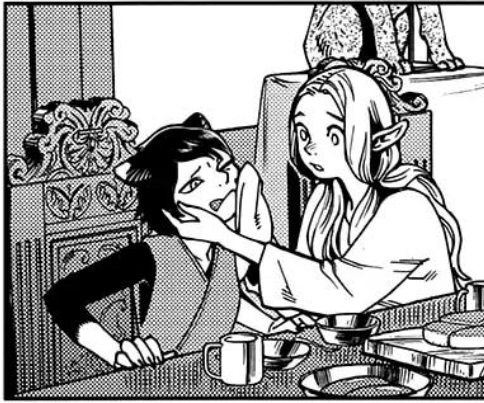

kabru isn’t treated like a servant, waiting on mithrun hand and foot…I mean he gives mithrun a foot massage but no one told him to do all that lmfao
he's also not the only one to care for mithrun. pattadol is shown to worry for him and milsril was the one to start taking care mithrun in the first place after he…...y’know. speaking of which-
they probably met when kabru was a kid!- neither of them showed signs of recognizing each other the entire time mithrun was introduced nor when they were together.
and im pretty sure KABRU of all people would show some kind of recognition if they'd met before. it's kabru!!! the people person!!! mr. "i-noted-down-50+-characters-in-this-dude's-backstory-for-fun-and-actually-enjoy-social-gatherings"
you would think some kind of memory would come back to him especially after hearing mithrun’s backstory if milsril had even told kabru about him as a kid. but nope. it’s just fan speculation unless there's a side comic suggesting otherwise that i haven't seen
mithrun doesn't care about kabru, his shapeshift double looked like shit!- it's obviously because of mithrun's (then) lack of desires that it looked like that, but they really grow on each other
i think it's safe to assume it'd look more like kabru after they spent so much time together (also laios can barely even remember kabru's name..also saw his face multiple times and didn’t recognize him when they talked for the first time)
mithrun is racist!- he’s actually the least likely character to be racist since he lost his desires and that includes a desire for superiority over others. he even calls his past self out on that part of himself. the other elves in that side comic were being just as racist to shorter lived races but just didn’t use ‘outdated slurs’
(unfortunately literally every main character in dunmeshi is at least a lil prejudiced, but I believe it’s worldbuilding and a sign of the times rather than a reason ryoko kui is giving to hate each character)
taking care of others is a pain in the ass!- saying this as a reason kabru and mithrun shouldn't be together is basically saying disabled people shouldn't be allowed to have romantic relationships because they're a "burden"...if someone is actually willing to put in the work, then let them be.
that's not even all of their relationship, mithrun is the fighter of their duo and kabru would've been killed by the shapeshifter or something if he'd fallen down the hole on his own since he sucks at fighting monsters.
mithrun helps collect ingredients for cooking every time, too (barometz fruits and griffin egg). he pulls his weight and then some!! i feel like people forget that part of mithrun a lot somehow.
+senshi literally cooks for everyone all time. it's kind of an important aspect of the narrative.
+also, while it is a popular fan thing I see around that kabru handfeeds mithrun, he literally never does lol this is mithrun using his own hands to eat:
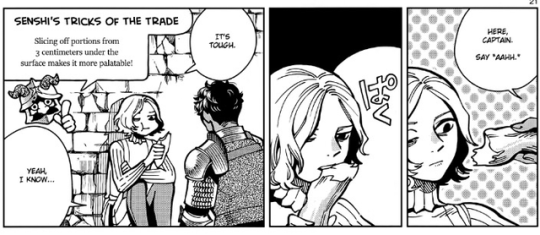
also here we have him washing his own body
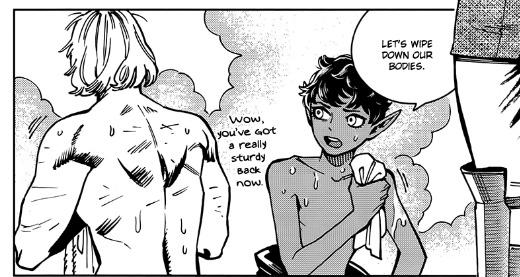
just saying because people like to treat mithrun like a baby even though the narrative respects him as a capable adult who also has special needs because of an accident. he’s captain for a reason
kabru hates taking care of mithrun!- not exactly, he was initially surprised and put off but got used to it quickly. i’m sure he’s grateful for all the times mithrun saved him from a monster and teleported them out of danger as well
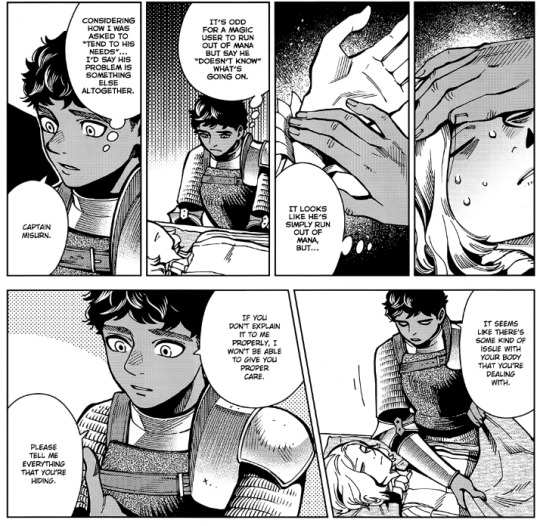
he even starts doing “unnecessary” things for mithrun’s comfort and safety like when mithrun pushes himself too hard fighting, even after his mission to take care of him was complete when the canaries came back
here is even kabru resting while mithrun keeps watch (mithrun let him sleep for 5 hours before waking him up from the nightmare earlier, too):
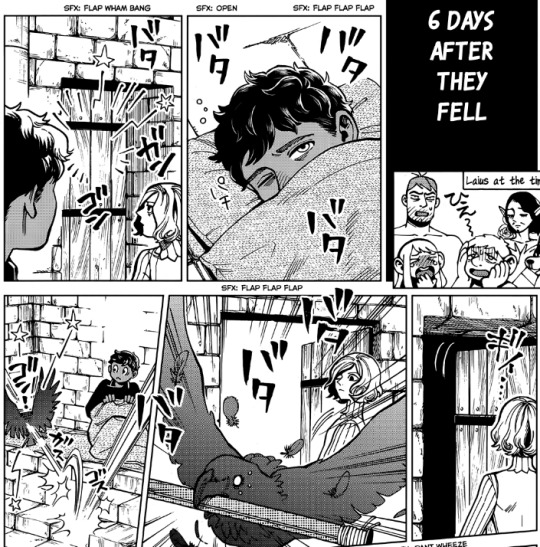
there's nothing more to their relationship!- they actually have had a very tight and consistent dynamic since they met and they incite the most change within each other by the end.
kabru is the one who inspires mithrun to create new desires so he doesn't waste away, and mithrun is the first person we see kabru being genuine with and it leads him to be more honest with others by the end instead of tiptoeing around everyone all the time (that mask was also the reason some ppl initially disliked kabru…)
kabru’s relationship with mithrun is honestly so important for his character and vice versa, but it’s often disregarded because of one over exaggerated aspect of it (an aspect that isn’t even the first way they interact with each other) or because people want to just straight up ignore it for some reason 🥲🥲
kui dedicates many panels to them that don't particularly serve the narrative as a whole in order to demonstrate this and i think that's pretty significant
you're taking this too seriously!- as if i'm the first person in the world to be crazy about a ship or the characters 😭 i love analyzing text and it's upsetting to see them mischaracterized when kui lays out the characters so clearly and deliberately
also they end up touching each other like all the time and have the kind of canon validation most ppl can only dream of lol i feel so insane look at this:
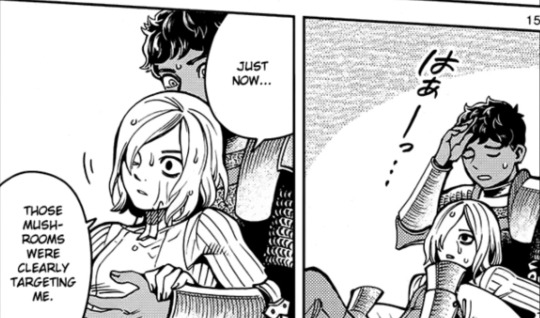
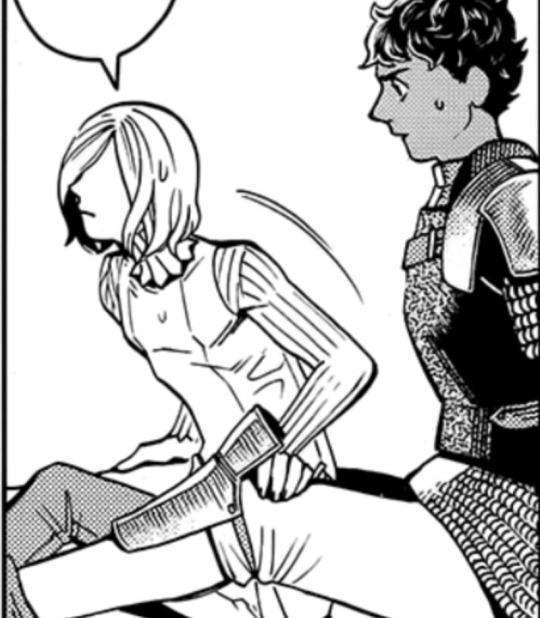
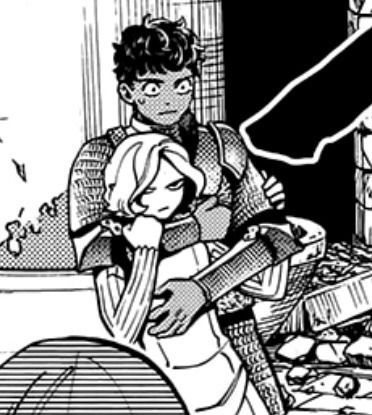
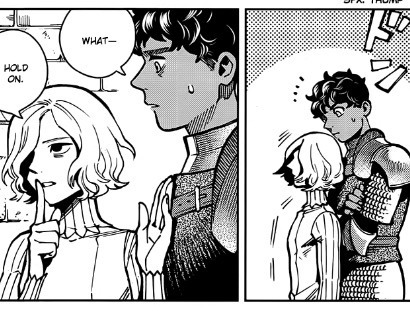
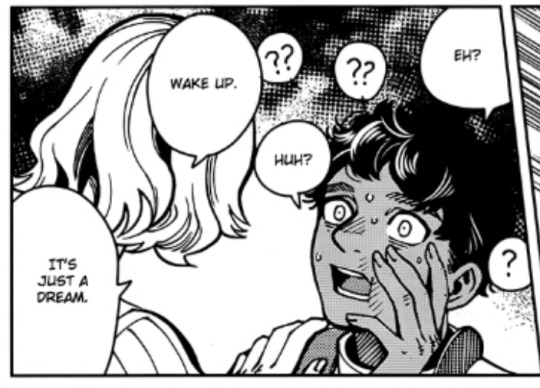
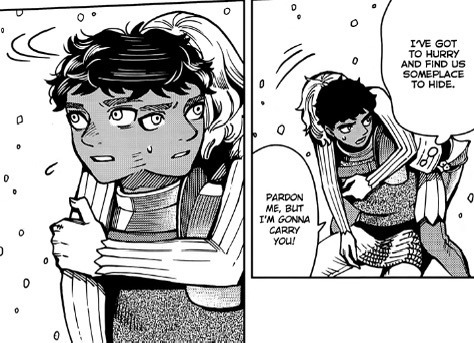
and this is just when they're first getting to know each other cuz there's a fuckload more
kinda hard to explain how i don't actually need them to get married or whatever but i'd die on this hill for them and i enjoy their dynamic immensely
haha you thought you were reading ship discourse but it was actually a character analysis 🤪🤪🤪
also don’t somehow take this to mean I think anyone has to ship them, I just need everyone to understand these accusations kind of don’t make sense especially when they can also apply to other pairs or characters
bonus kabru just looking at mithrun:

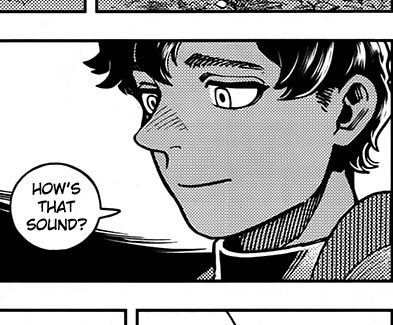
#dungeon meshi#kabumisu#kabru of utaya#mithrun#dungeon meshi spoilers#i'd rather be able to enjoy their dynamic without feeling like i have to explain it but i keep seeing the same takes i cant do this anym-#i feel like i advocate for kabumisu so much because i see so many people mischaracterizing kabru to make l4bru work like how they want#by saying he’s obsessed w laios because he thinks he’s hot..but he was curious about his autistic behavior and eventually thought his lack#of malice would make laios the best candidate for becoming dungeon lord to prevent another utaya tragedy. tho eventually he doubts that#not that i care that he's shipped with laius. i just want ppl to see kabru for who he IS bc some still think hes nothing but a shady bicth#i think that's best shown through his dynamic with mithrun (other than his own words of course) so i want ppl to acknowledge it properly#like idk if I can trust popular fan interpretations of the characters or relationships anymore after the shit with toshiro bro 💀💀#not trying to attach kabru’s entire being to mithrun or anything either just..saying#hm i feel like the way i worded all of this will make some ppl mad. not my intention but whoops#anyways has anyone drawn ship art of senshi and mithrun yet? anyone?
410 notes
·
View notes
Text




various situations
#im having so much fun this guy is RIDICULOUS#i loved playing the little part in aa3 where he takes over for Phoenix after he jumps off the fuckin bridge#and I’ve been looking forward to playing investigations#he is unhinged truly#and turnabout reminiscence which i just finished now is so good#young Edgeworth is insane im also going insane#i love the little sprites omg#also just in case anyone doubts how insane I’ve become i have spent literally all summer just playing all the ace attorney games like#im serious it has been 10 games? I’ve put in probably by now 350 hours just in ace attorney this summer#I literally cannot stop playing#something’s deeply wrong with me now.#anyway#miles edgeworth#ace attorney#aai1#aai1 spoilers#idk how to tag for spoilers here there are so many acronyms
329 notes
·
View notes